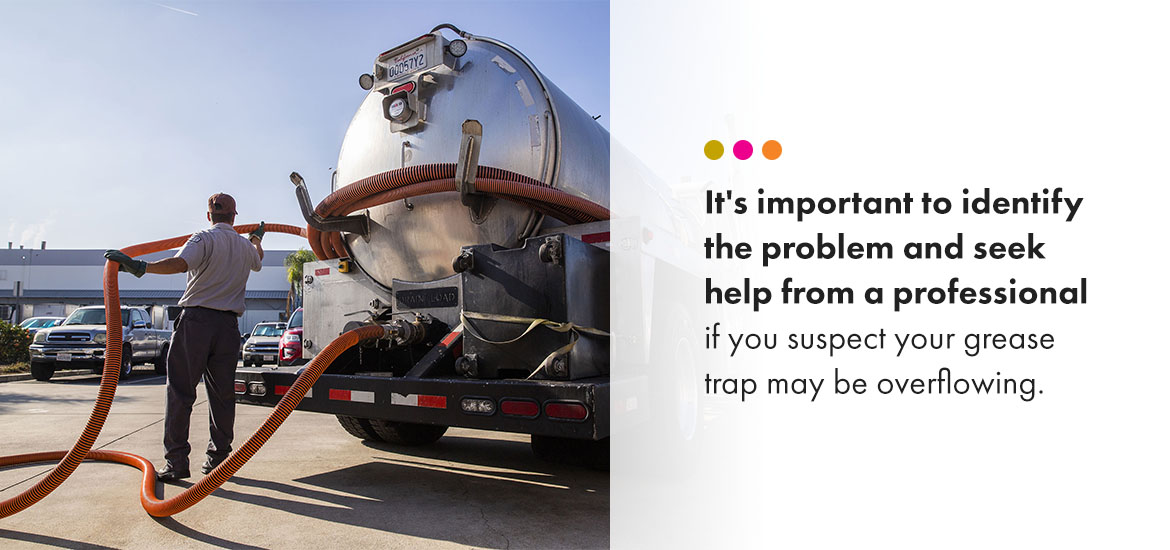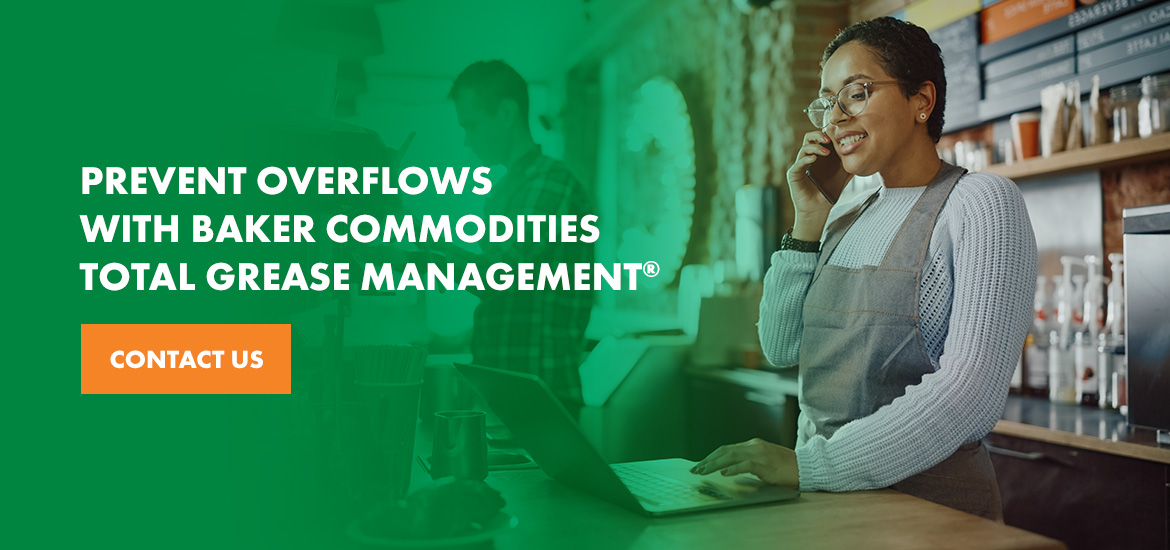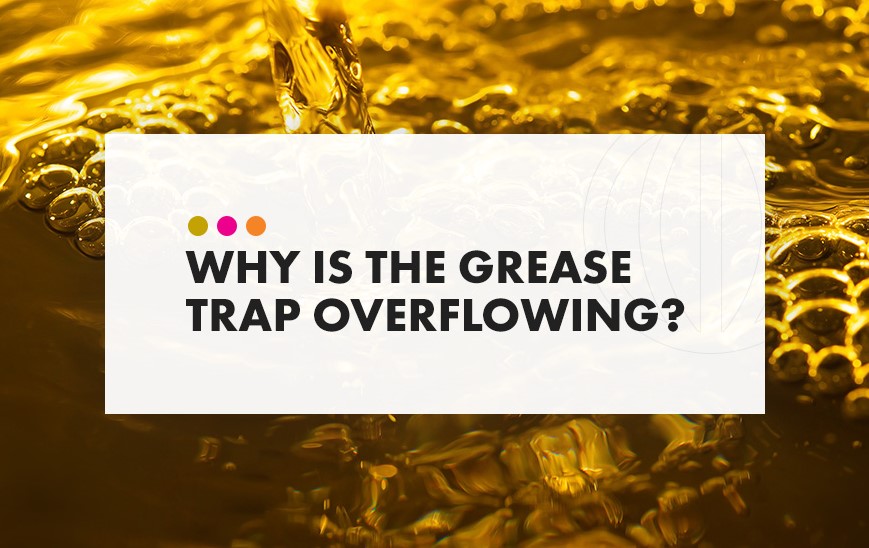Why Is the Grease Trap Overflowing?
Table of Contents:
- 5 Common Reasons Why Grease Traps Overflow
- How to Unclog a Grease Trap
- How to Prevent Your Grease Trap From Overflowing
Grease trap overflow is a situation that you should address as soon as possible when it occurs. You can prevent your grease trap from overflowing by understanding how grease traps work and taking preventative measures. We created this guide of grease trap solutions to help you maintain your grease trap and prevent overflows.
5 Common Reasons Why Grease Traps Overflow
A dirty grease trap can lead to overflow and cause serious complications. Grease trap overflows can harm the environment, turn customers away and lead to costly repairs, fines and legal penalties. They often occur for the following reasons:
1. The Outgoing Line Is Clogged
When your grease trap’s outlet line is clogged, the grease trap and all your drains can overflow. Your grease trap’s crossover line that connects the solids and liquids compartments can also become clogged, causing the liquids compartment to exceed its normal limit. Contact a plumber to inspect your main sewer line if you notice that your drains are not draining properly.
2. The Plumbing Is Clogged
A clogged grease trap can lead to other plumbing issues. If a trap’s inlet and outlet lines are blocked, and the trap is well-sealed, it can prevent the sink connected to the grease trap from draining. If you notice your sink draining slowly, the grease trap’s inlet line, outlet line or baffles may have a partial obstruction. If multiple toilets and sinks will not drain, the obstruction may be in a mainline or a branch.
It’s essential to keep your plumbing system free of obstructions. Clogged drains and pipes can release strong odors throughout your restaurant or facility.
3. The Trap Is Overloaded With Food Waste
Excess food waste can overload your grease trap. Your trap may collect excess food waste when:
- Your production level increases.
- People force waste down the drain.
- A new menu item increases food waste.
- New or uninformed staff members incorrectly dispose of food waste.
4. The Trap Isn’t Emptied Often Enough
If your grease trap overflows, its contents might have exceeded its limit. When a trap is excessively full, grease from the primary compartment will overflow into the secondary compartment. Eventually, the excess contents will also begin to clog the grease trap’s inlet and outlet lines.
A full trap can restrict water flow throughout your system, resulting in dishwasher pit and sink backups. If you notice backed-up water or foul odors, you may need to schedule grease trap servicing more frequently.
5. Rodents Are Entering the Trap and Causing Blockages
If your grease trap does not have an adequate seal, rodents may be able to enter through the gaps. A rodent can become an obstruction in your grease trap if it has easy access, so proper sealing is essential. If you’ve recently addressed the presence of rodents in your restaurant, you may also want to check your grease trap to make sure it is clear of any small animals.

How to Unclog a Grease Trap
It’s important to identify the problem and seek help from a professional if you suspect your grease trap may be overflowing.
First, check your grease trap, hatches, vents and sewers to ensure they are free of rodents. If any creatures have access to your system, you will need to identify any existing gaps and seal access points to prevent further issues with rodents.
Next, pour water into your trap to check if it is too full. Overflowing water indicates that you’ll need a professional to empty your trap. You can also check your pipes for any obstructions and contact a plumber to remove them and replace any corroded pipes.
It’s crucial to contact a professional to empty your trap. Grease traps usually overflow due to a line obstruction, and hydrojetting will correctly resolve this issue. Attempting grease trap overflow cleanup yourself can lead to further complications. A professional can properly empty your grease trap and address obstructions in the line or any other issues causing it to overflow.
How to Prevent Your Grease Trap From Overflowing
Preventing your grease trap from overflowing is vital because an overflow can harm the environment and negatively affect your business. You can avoid grease trap overflows with the following measures:
- Schedule regular maintenance: Grease traps require regular maintenance and cleaning. Hire a professional to perform grease trap cleaning and maintenance so you can prevent issues in the future. Preventive maintenance can help you save money on costly repairs by letting your grease trap operate smoothly.
- Contact pest control: As important as it is to keep pests out of your restaurant or facility, it’s equally important to keep them out of your grease trap. Contact a professional to ensure your trap has a proper seal free of gaps. You can also set rodent traps to protect your restaurant and grease trap.
- Add a strainer to catch food debris: Solid waste can obstruct your grease trap. It’s vital to catch as much food debris as possible to keep it from filling up your trap. Add a strainer to each drain in your kitchen to prevent food debris from entering the trap.
- Properly scrape all plates: One of the leading causes of overflowing grease traps is the presence of food waste in the drains and trap system. Properly scrape all plates into the correct waste containers before washing any dishes. Doing this will prevent a large number of grease trap problems that could occur.
- Train your staff on how to care for the grease trap: New or untrained staff may not understand how the grease trap works or what they can do to prevent it from overflowing. Train all staff members on properly disposing of grease and food waste and ensure they understand your grease trap’s limitations. Proper training and education will prevent your employees from forcing waste materials down the drain or overloading the trap.
Grease Trap Preventative Maintenance
Prevent Overflows With Baker Commodities Total Grease Management®
Your grease trap keeps your plumbing system running smoothly and prevents waste materials from harming the environment. Maintaining your grease trap and preventing overflows helps protect the environment and lets you avoid costly repairs. Baker Commodities can help you keep your grease trap in shape with Total Grease Management® services.
Baker Commodities will pump and drain your grease trap properly and perform regular preventative maintenance to prevent overflows and potential damage. We also offer services such as commercial hydrojet drain cleaning, power washing, full-service plumbing and grease collection. Contact us to learn more about Total Grease Management® services and how we can help you prevent overflows.




